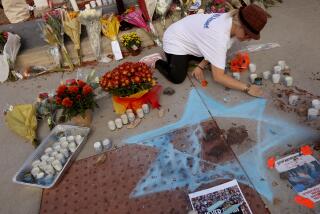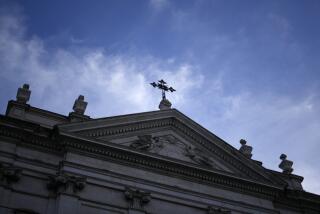Faith leaders encourage public lament for Sikh temple tragedy
The recent slayings at a Sikh temple, allegedly committed by a white supremacist, no doubt have prompted moments of private reflection, perhaps prayer. A coalition of religious leaders now argues that such moments, though admirable, are not enough — that extreme violence demands unified expressions of grief.
“This is a time for public mourning and public lament,” said Mark S. Hanson, presiding bishop of the Evangelical Lutheran Church of America.
Hanson, joining other religious leaders in a teleconference with reporters Thursday, said that “we have underestimated” the power and value of public lamentation. Such action, he said, “names sorrow, names injustice” and by doing so creates a “community of suffering” that can combat injustice.
PHOTOS: Gunman opens fire at Sikh temple
Kathryn M. Lohre, president of the National Council of the Churches of Christ in the USA, echoed that theme. “Public mourning can lead to public action,” she said.
The Rev. Peter Morales, president of the Unitarian Universalist Assn. of Congregations, offered another reason for unified expressions of sorrow. Public silence, he said, can be misconstrued as indifference or support of violence.
The shootings Sunday left six people dead, plus the gunman. Three others, including a police officer, remained hospitalized Wednesday in critical condition.
Lohre — like other Christian, Muslim and Jewish representatives — called on Americans to attend memorial services, pray for the victims and visit Sikh temples to express condolences and show their solidarity with the Sikh community. The speakers also decried the recent burning of an Islamic Center in Joplin, Mo.
Lohre was among those who noted that since the terrorist attacks of Sept. 11, 2001, various religious groups have worked to educate the public about Islam. They cited the efforts of a group called Shoulder-to-Shoulder: Standing with American Muslims, which was created in 2010 to speak out against anti-Muslim sentiment that rose as the 10th anniversary of Sept. 11 approached.
WHO THEY WERE: Victims of the temple shooting
The leaders said the Sikh temple attack in Oak Creek, Wis., shows that such education efforts must go beyond Christianity, Islam and Judaism -- the Abrahamic faiths with roots reaching to the Prophet Abraham. Now, efforts must be made to educate the public about other faiths, Lohre and others said.
The leaders also warned of the dangers of harsh public discourse, saying it promotes intolerance and, ultimately, contributes to violence.
Authorities have said they do not know conclusively why the gunman, suspected to be Wade Michael Page, opened fire on Sikhs at their temple, though it’s been established that Page held racist views.
Again and again, the speakers said religious intolerance is fundamentally un-American. As Imam Mohamed Magid, president of the Islamic Society of North America, put it: “An attack on one religion is an attack on all religions.”
Also participating in the teleconference were Rabbi David Saperstein, director of the Religious Action Center of Reform Judaism; Rabbi Burton L. Visotzky, director of the Milstein Center for Interreligious Dialogue at Jewish Theological Seminary; the Rev. Richard Cizik, president of the New Evangelical Partnership for the Common Good; and Bishop Denis J. Madden, chairman of the Bishops’ Committee on Ecumenical and Interreligious Affairs, United States Conference of Catholic Bishops.
ALSO:
NOAA: Hurricane season might not be so mild after all
JetBlue pilot will have more evaluation after psychotic episode
Death pact? Ohio man charged in hospital shooting death of wife
More to Read
Start your day right
Sign up for Essential California for news, features and recommendations from the L.A. Times and beyond in your inbox six days a week.
You may occasionally receive promotional content from the Los Angeles Times.






